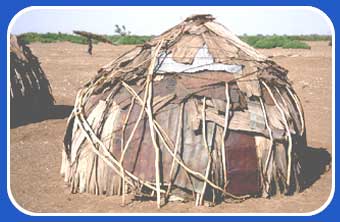|
|

|
|
|
|
| |
|
|
|
|
| |
 |
Look
at the two pie charts. How are the types of
work in Ethiopia different from the UK? |
| 80%
of Ethiopians work in farming. In areas where
there is regular rainfall and fertile soil,
they grow crops in fields to feed their families.
In other areas, they rear animals, moving
their herds in search of fresh pastures. As
well as meat and milk from animals, their
hides can be sold and turned into leather.
|
 |
|
|
|
|
|
|
|
|
|
|
| |
| What
kind of animals do the farmers have in the
picture? |
 �
Pietro Cenini/Panos Pictures.
�
Pietro Cenini/Panos Pictures.
|
|
|
|
|
|
|
|
|
|
|
| |
 |
Some
farms grow crops to sell in local markets,
or even to export them to other countries.
These are called cash
crops . One of the most important cash
crops is tea. Tea is grown on big farms called
plantations
. See if you can guess what other cash crops
are grown in Ethiopia by looking at the pictures
below. Move your cursor over the pictures
if you need any help! |
|
|
|
|
|
|
|
|
|
|
| |
| Ethiopia's
main cash crop for export is coffee, which
grows well on the mountain slopes. Sometimes,
the price of coffee on the world market drops.
Can you think what effect this would have
on Ethiopian coffee farmers? |

|
 |
To
make more money from cash crops, especially
when world prices are low, farmers have to
grow more. This can put the land under pressure.
The soil's nutrients can be used up, and the
structure of the soil weakens, making it easier
to be blown away by wind, or washed away by
rain. |
|
Some people in Ethiopia are very poor. The
average income per person is about �150 a
year, among the lowest in the world. That's
about �2.80 a week, or 40p a day. Also, the
country is in debt to foreign banks and agencies.
This makes it difficult for the government
to spend money on schools, roads and hospitals.
|
 |
 |
The
international community has given many millions
of pounds' worth of aid and food over the
years. But poorer people in Ethiopia do not
want to rely on handouts. Instead, poorer
communities work together to help each other,
and make the most of local resources. |
| Across
Ethiopia, families make their own houses using
pieces of metal and wood. |
 |
|
|
|
|
|
|
|
|
|
|
| |
| These
'Tukul' houses are well built, to stand
up to wind and rain. Some even have two
floors. |
 �
Dominic Harcourt-Webster/Panos Pictures.
�
Dominic Harcourt-Webster/Panos Pictures.
|
|
|
|
|
|
|
|
|
|
|
| |
 |
Apart from farming, what other jobs do people
do?
There
are plenty of important jobs to do around
the home, some of these jobs we take
for granted in the UK. Look at the two
pictures below. Can you guess what they
are doing? Click on the help button
if you need a clue. Why is it easier
for us to provide these things in the
UK?

|
 |
|
|
|
|
|
|
|
|
|
|
|
| |
�
Dominic Harcourt-Webster/Panos Pictures.
|
|
|
|
|
|
|
|
|
|
| |
 |
There
is also a small amount of industry in Ethiopia.
There are factories producing drinks, textiles,
chemicals and cement, but they provide few
jobs. Can you think of at least two reasons
why a greater number of industries would be
good for Ethiopia? |
|
|
|
|
|
|
|
|
|
|
| |
 |
To
find out more facts and figures about Ethiopia,
click on the button below to take you to the
Data File. |
|
|
|
|
|
|
|
|
|
|
|
|
|
|
|

